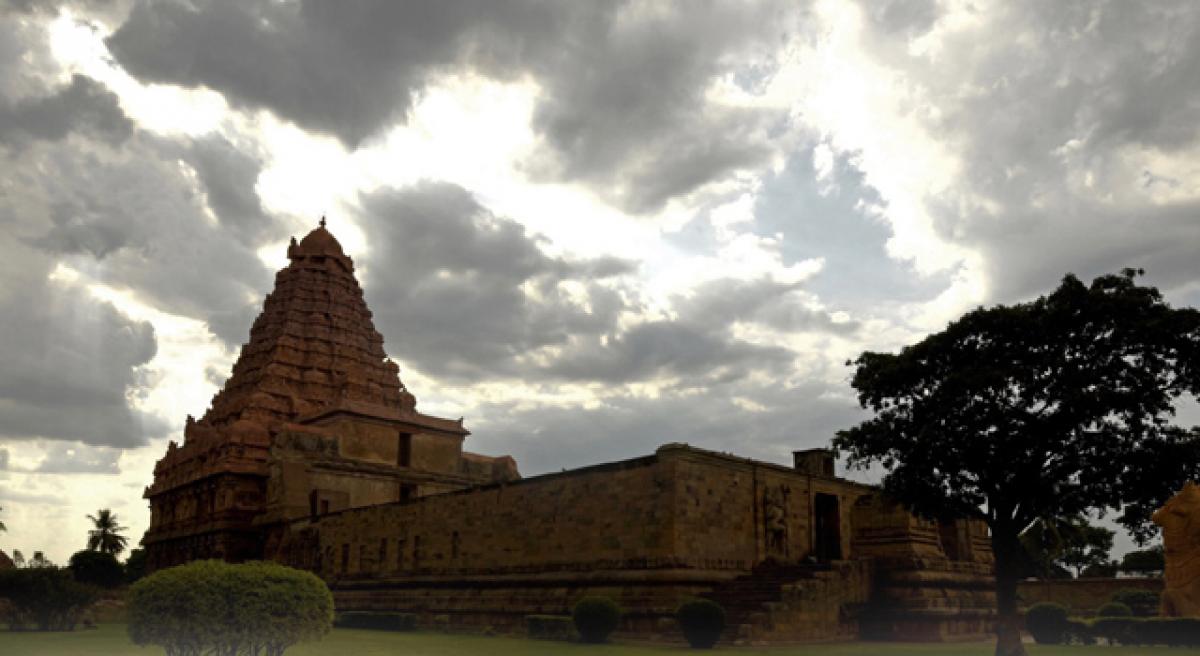Just In

Thanjavur, mostly known for the Tanjore Paintings that are unique to this region, is not just important for its art but also its architecture, what with the first of the three Great Living Chola Temples sited at the heart of this town.
Thanjavur, mostly known for the Tanjore Paintings that are unique to this region, is not just important for its art but also its architecture, what with the first of the three Great Living Chola Temples sited at the heart of this town.
Constituting the Brihadeeswara Temples at Thanjavur and Gangaikonda Cholapuram and the Airavateswara Temple at Darasuram, this unique group of living temples was built by the Cholas, who were undoubtedly one of the most powerful monarchies of South India that ruled for over four-and-a-half centuries.
All of these ancient temples are the “living temples” in the sense that the pattern of worship and rituals established over a thousand years ago continue as is to this day.
The Cholas are believed to have had a lasting impact not just in terms of setting in stone a very distinctive phase of Tamil culture but also in terms of their influence on the art and architecture of Southeast Asia.
Locally known as the Big Temple, the Brihadeeswara Temple in Thanjavur is grandest of the three and work on this magnificent structure began in 985 CE by Rajaraja I.
From the massive monolithic Nandi, mount of Lord Shiva, who is Brihadeeswara, to the incredibly beautiful murals painted all along the circumambulatory path around the temple, the beauty of this place will take you back in time for sure.
This temple complex was later fortified in the 16th Century within the fort walls of Sivganga Little Fort and a moat; all of which stands relatively unscathed even today.
Second on the list is the Brihadeeswara Temple at Gangaikonda Cholapuram, a tiny little-lost village, which is a two-hour drive from Thanjavur.
Built on the same lines as the Big Temple, complete with a massive sculpture of Nandi facing the main shrine, this temple complex was not just beautiful but also tranquil with an all-pervading sense of peace, owing probably to its secluded location and also the fact that it was evening by the time we got there and the setting sun chose to hide behind the looming rain clouds.
Although the bronze sculptures of this temple are said to be priceless specimens of the Chola art, it was the “Simhakeni” (Lion well), which I found intriguing.
The last temple in this ageless group of living temples and also the smallest is the Airavateswara Temple at Darasuram. Built by Rajaraja II in the 11th Century and designed to look like a chariot on wheels, it is no less ornate than the others and just as magnificent with its rows of Nandis all along the boundary walls.
The Cholas have left behind the finest works exemplifying the pure Dravidian style of architecture and this set of temples are but the most significant archaeologically and culturally, for they believed that these were not just a place for their people to get together and pray but was the epicentre of economic activity.
No trip to Thanjavur would be complete without witnessing these marvels of workmanship. The sheer size of these temples will cause you to wonder, muse on the scale at which affairs of the state were once carried out.
Fact File: Begin your day trip with the Brihadeeswara Temple in Thanjavur, located right at the heart of the city. Go on to the Airavateswara Temple at Darasuram and also stop for lunch along the way on this 37 km stretch.
Complete the circuit with the Brihadeeswara Temple at Gangaikonda Cholapuram. 72 kms from Thanjavur, getting back to the city will take around two hours.

© 2024 Hyderabad Media House Limited/The Hans India. All rights reserved. Powered by hocalwire.com







